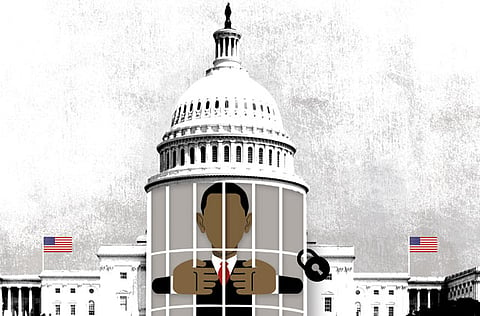Obama and the myth of the imperial presidency
Many of Obama’s liberal supporters yearn for a different sort of president

If you needed confirmation that American liberals and conservatives inhabit parallel universes, just consider the reaction to last week’s deal on the fiscal cliff. Conservatives saw a ruthless Barack Obama, ramming through his agenda. Liberals lamented a limp surrender by the president.
However, these two very different lines of attack on Obama have something important in common. Both liberals and conservatives remain addicted to the myth of the imperial president. They expect the occupant of the White House to be a towering figure — a Lincoln, a Roosevelt, a Johnson — who dominates politics and shapes history.
In reality, Obama is a prisoner of circumstances. He cannot pass laws or get a budget through without the consent of a House of Representatives that is controlled by his bitter ideological and political foes. No president — however brilliant, determined or wise — can create rational and effective policies from such circumstances.
Many liberals dreamt that Obama would be set free by re-election. Without the burden of running for office, he would be the president of Hollywood dreams: Speaking out boldly, vanquishing the bad guys.
Instead, they are beginning to fear that Obama II will look much like Obama I: Dignified, articulate, above-the-fray, cautious, constrained. Even the president’s success in forcing a reluctant Republican party to accept higher taxes on the rich did not persuade those who charge him with weakness. In the Washington Post, David Ignatius lamented that the president went “missing in action” on the fiscal cliff negotiations — and failed to provide leadership. My colleague Martin Wolf puts the case for those who see the deal as a capitulation, arguing that Obama “has achieved nothing of importance and given up the only card he had — the automatic expiry of the Bush tax cuts. In a game of chicken, he has swerved, again”.
Elizabeth Drew, a much-respected Washington commentator, bemoans “Obama’s caution, his oft-displayed lack of stomach for a fight”. Even the president’s reaction to the massacre at Sandy Hook school has come under critical scrutiny. His speech was affecting, but still exquisitely tactful. At no point did he directly take on the National Rifle Association.
Many of Obama’s liberal supporters yearn for a different sort of president: Somebody more like Franklin Delano Roosevelt. It was FDR who, in the appropriately pugilistic setting of Madison Square Garden, delivered a 1936 speech denouncing his political enemies. “They are unanimous in their hatred for me,” he roared, “and I welcome their hatred.”
It is impossible to imagine Obama saying something that direct and brutal. Unlike the blue-blooded Roosevelt, Obama’s life taught him to avoid confrontation. In his autobiography, the president wrote that as a young man he discovered that: “People were satisfied so long as you were courteous and smiled and made no sudden moves ... such a pleasant surprise to find a well-mannered young black man who didn’t seem angry all the time.”
Obama turned this personal insight into a political strategy and built his national political career as a conciliator — somebody who could bridge the gap between black and white Americans and between red and blue states. These personal differences help explain why Obama can never be an FDR and “welcome” the hatred of his enemies.
However, there are also more prosaic — and ultimately more important — political explanations.
In the 1930s, Roosevelt had the benefit of working with massive Democratic majorities in Congress. He could afford to insult the Republicans and their backers. By contrast, Obama only had majorities in both houses of Congress for the first two years of his presidency — and his party’s majority in the Senate was smaller and more vulnerable than those of either FDR at the height of the New Deal or Lyndon B. Johnson, when he was pushing through the Great Society reforms of the 1960s.
Even if Obama is now sorely tempted to make a few “sudden moves” and take on the Tea Party, all-out confrontation will not be an intelligent political strategy. The truth is that he needs Republican votes if he is to achieve any of the cherished liberal goals — from gun control to tax reform.
In any case, the idea that Obama is a jelly-spined conciliator will be greeted with incredulity by his political foes. Prominent conservative commentators see a completely different president. Charles Krauthammer credits Obama with a “rout” of his opponents in the fiscal cliff negotiations. Peggy Noonan complains that “he taunted the Republicans in Congress” and calls him “a uniquely polarising figure”.
As for Obama, he may be tempted to adopt what I think of as the BBC defence, which is to say: “If I am being criticised by both the left and the right, I must be getting it roughly right.”
The president should certainly take any solace he can get. America has avoided the fiscal cliff, but in just a few weeks, it will bash into the debt ceiling. Changing the metaphor, unfortunately, does not alter the problem. The president may be, according to popular lore, the “most powerful man in the world”. But, when it comes to domestic politics, he is too often the helpless prisoner of a broken system.
— Financial Times



